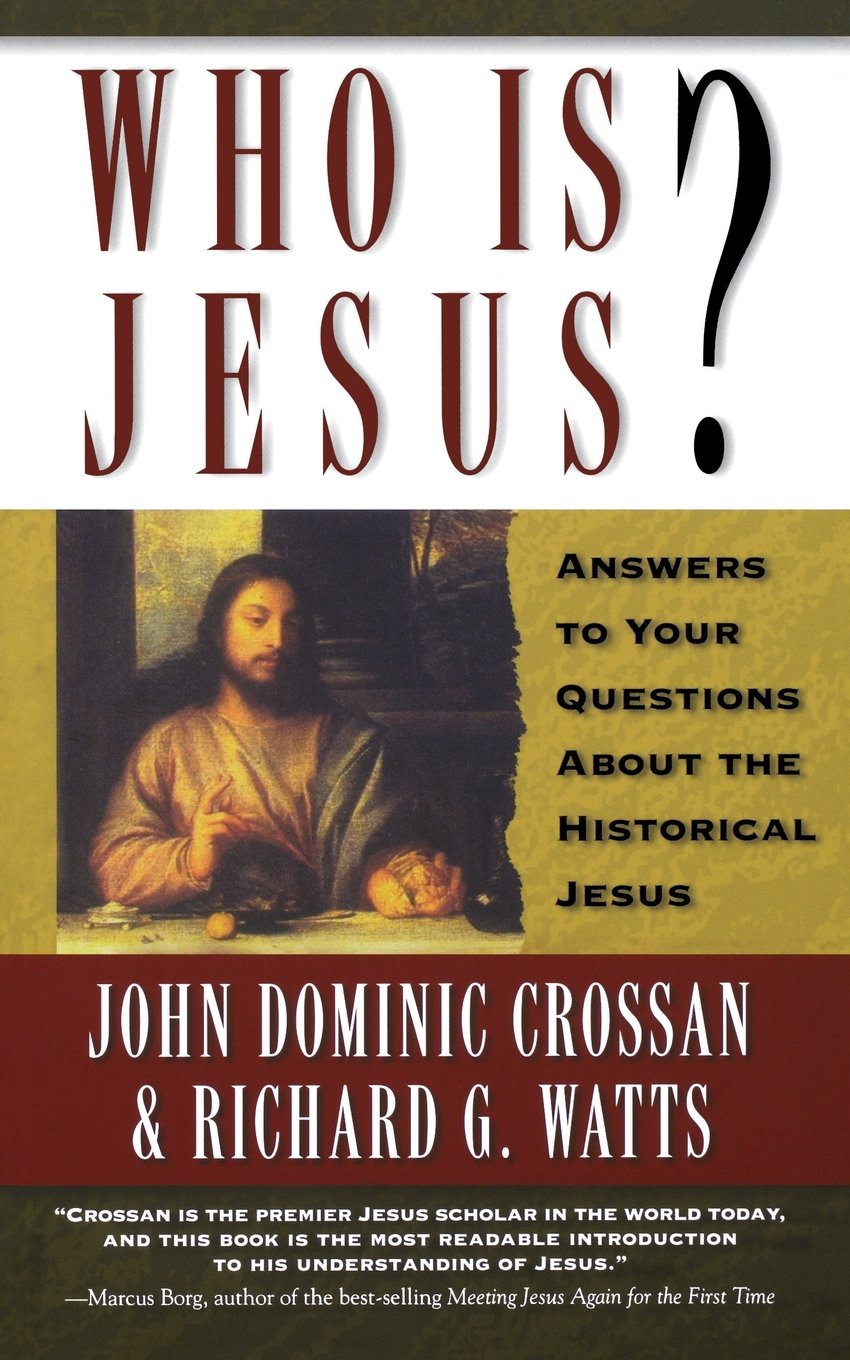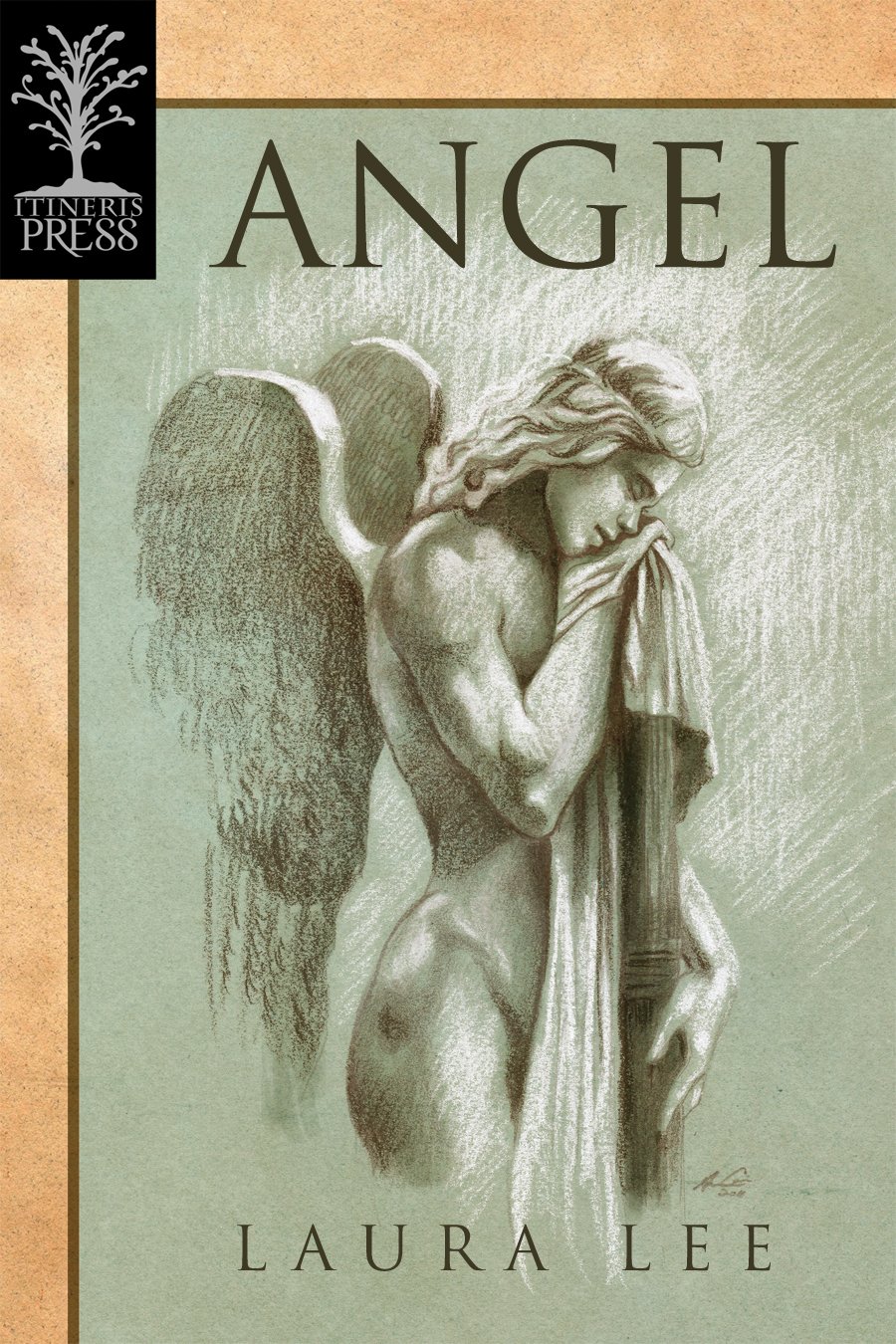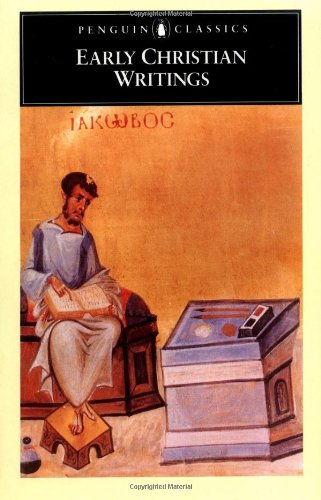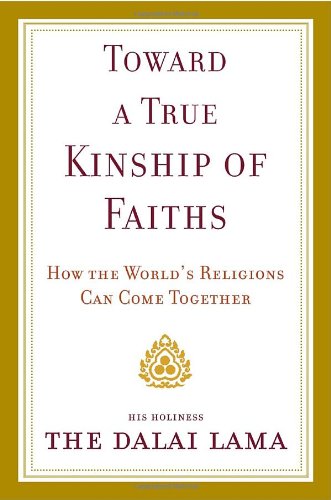Book review: Who is Jesus?
by John Dominic Crossan and Richard G. Watts
★★★★★
This is a short, very readable book (now fifteen years old) that does an excellent job of introducing the Historical Jesus; Crossan’s take in particular. Labeled by liberal Christian Marcus Borg as the “premier Jesus scholar in the world today,” Crossan’s picture of Jesus is controversial and base … which is precisely what you would expect of research into the “historical Jesus.” It’s about the flesh-and-blood man who walked the earth, not the legends that grew about him. A series of contrived questions meant to introduce the topic and the scholarship of Crossan and Watts steer the reader through the life and death of Jesus; how he lived, what he taught, what he really hoped to accomplish.
According to Crossan, Jesus was not really born of a virgin, performed no nature miracles, and never rose from the dead. Probably, he was never buried to begin with, as that would be uncommon for a crucifixion victim. Jesus was a social revolutionary with a humanitarian vision of a “Kingdom of God,” which, by Crossan’s definition, is how Jesus imagined “the way a kingdom on this earth would be established if God were in control.” This vision left Jesus in conflict with the Roman Empire, and eventually led to his arrest and sentence. By the Romans, of course, not the Jews.
Crossan insists that his book is not meant to be about Christ, but only about Jesus. Faith is not about Jesus, or about any historical reconstruction of his life, but about Christ. “Jesus”is the historical person; “Christ” affirms who he is for believers, and Christian faith is always faith in the historical Jesus as a manifestation of God to us. As Crossan explains, faith cannot ignore or bypass the historical facts, but faith goes beyond the facts to wrestle with the meaning.

Matthew 2:1, The Three Wise Men
Now when Jesus was born in Bethlehem of Judaea in the days of Herod the king, behold, there came wise men from the east to Jerusalem.
//Quick, now. How many wise men (magi) were there?
If you said three, you’re probably right.
Yes, I know, the Bible doesn’t say. How often have we all heard (usually in a smug tone) that the Christmas stories have it all wrong, and nobody knows how many wise men there really were?
It may be that the idea of three wise men derives from the three gifts they brought: gold, frankincense, and myrrh. Or another reason may be seen in the stars: Many traditions have called the three stars of Orion’s belt the “kings” or “magi.” They form a direct line to Sirius and appear to follow him straight to the birthplace of the sun. Try to find them early on Christmas morning—they’ll be the brightest stars you see. (I’ve never sat out on Christmas morning looking for the magi in the sky, so don’t take my word for this; I’m merely passing on a controversial explanation.) But there’s a far more logical reason to imagine there were exactly three wise men.
For whatever reason, the story of Jesus closely mimics a number of Old Testament themes, and Matthew especially loves to relate these themes. Jesus’ birth is no exception to the rule. The Christ child is born miraculously of a virgin; Isaac, considered a typology of Christ in the Old Testament (he is offered as a sacrifice by his father, just like Jesus) is likewise born miraculously, this time to a postmenopausal woman. So, let’s go back to the story of Abraham and Sarah, parents of Isaac. What do we find?
Three wise men! Three mysterious strangers led by God to Abraham and Sarah, foretelling Isaac’s miraculous birth.
Got an opinion? 2 commentsBook review: Everything I Know About God I Learned From Football
by Eric Chaffin
★★★★
My beloved Vikings are 0-4. Could be a long season. In desperation, I found this little book of inspiration. The Forward promises, “Everything I Know About God I Learned From Football is a book that beautifully offers both the sports fan and the disciple of Christ a formula for success.”
Chaffin tells stories from the gridiron, and relates them to the Bible and Christian life. He writes from a conservative perspective, providing encouragement and spiritual direction. It’s a serious topic, but told in a way that makes sense even with a beer in one hand and a remote control in the other. Each chapter concludes with a red-zone push (a bulleted summary) and a post-game kneel (a short prayer).
Cute, personal, a little sappy from a guy’s perspective. Buy it for your guy and set it on the armrest of his easy chair for halftime reading. Maybe he won’t totally forget about God this Sunday.

1 Kings 3:24-25, Cut the baby in two!
Then the king said, “Bring me a sword.” So they brought a sword for the king. He then gave an order: “Cut the living child in two and give half to one and half to the other.”
//Everyone knows this famous story displaying the wisdom of King Solomon. As it happened, two women bore babies within days of each other. The two are sleeping alone in their home at night, when one rolled over on her newborn son, killing him. So, she got up and swapped sons.
In the morning, the second woman realizes what happened, and takes the issue to the king. Solomon says cut the baby in half, and naturally the true mother objects, offering to give the baby to the other in order to save its life. In this way, Solomon learns the true mother of the living child, and awards it to her.
Ever wonder how this became a legal matter in the first place? Where were the fathers? Why are two women living alone in the same home?
Turns out the two were prostitutes. But that only brings up another sticky question. How is it that two prostitutes easily gain presence in the king’s court? Weren’t seven hundred wives and three hundred concubines enough for Solomon?
Sometimes the story behind the story is even more bizarre.
Got an opinion? 0 commentsBook review: Angel
by Laura Lee
★★★★
An uncomfortable page-turner. I’m glad I read it, but glad to be finished. Not that the book is distasteful; it was just a foreign and unsettling topic for me. But that’s why I asked Lee for a review copy.
Lee’s protagonist is a middle-age minister who has lost his wife, and suddenly finds himself attracted to a young man, despite the church’s disapproval. They find it necessary to hide their friendship, which is both demeaning and spiritually draining. Shipwreck seems inevitable.
Lee writes with insight and flounce, and you just can’t put the darn thing down. The language is a bit crude in places, but appropriately so, as it does define the characters and our minister’s descent/growth (I’ll let you decide which). The story ends appropriately, which is all I dare say on that matter, except to promise it will leave you thinking about the not-so-subtle discrimination against sexual orientation in today’s Christianity, and the emotional scars and marginalizing it causes.

Mark 6:45, The Great Omission
And straightway he constrained his disciples to get into the ship, and to go to the other side before unto Bethsaida, while he sent away the people.
//A while back, I reviewed a book titled “Q.” This gospel is considered to be the other half of the two-source theory. The idea is this: Most of the book of Mark is repeated in both Matthew and Luke, making one think that those two Gospel writers wrote with Mark in hand. But Matthew and Luke also share a number of other common themes, enough for scholars to hypothesize the early existence of another document, a sayings Gospel, which they’ve unimaginatively titled “Q,” meaning quelle, or source.
The two-source theory has become the most commonly accepted explanation among scholars of how the Synoptic Gospels were derived. But there is potentially a big problem with it. Today’s verse begins a long passage in Mark, covering nearly two chapters from 6:45-8:26, that do not seem to be represented in Luke. If Luke used Mark as a source, why did he omit this section?
The Great Omission included Jesus walking on water, his healing at Gennesaret, the healing of a deaf and dumb man, the feeding of the four thousand, the Syrophoenician woman, and the healing of a blind man at Bethsaida, among other pericopes.
Got an opinion? 0 commentsBook review: Early Christian Writings
Letters of the Church Fathers
★★★★
If you’re looking for a brief collection of early Christian writings, this one hits all the high points. For someone wanting a taste of the emerging church, Christianity in its infancy, nothing beats reading the letters and theological treatises themselves, and this is a good collection. Nothing fancy; the introduction is short and the notes are sparse, limited primarily to historical settings, so you’re getting it from the horses’ mouths.
And what you’re getting is the founding Fathers, after the excitement of the first century and its expectation of the immediate return of Christ died down. The men who took the scriptures seriously and built a religion for the long haul. Jewish customs are still evident, early doctrine is solidified, martyrs are glorified. Here’s the lineup:
The first epistle of Clement to the Corinthians
Seven epistles of Ignatius
The epistle of Polycarp to the Philippians
The martyrdom of Polycarp
The epistle of Diognetus
The epistle of Barnabas
The Didache
This is a Penguin Classic, translated by Maxwell Staniforth with commentary by Andrew Louth.

John 8:41, Was Jesus Illegitimate?
“We are not illegitimate children,” [the Jews] protested. “The only Father we have is God himself.”
Some interpret this verse to be a subtle accusation by the Jews that Jesus was illegitimate. As in, “we aren’t the illegitimate ones, you are.”
It appears that quite early after the Gospel story began, rumors began to surface that Jesus was illegitimate. That Mary had been raped by a Roman soldier named Pantera. I personally don’t buy it, the whole accusation sounds like “normal” slander bolstered by flimsy evidence, but the logic runs something like this:
John the Apostle (or The Beloved Disciple, if you prefer) knew Jesus best, having been with him from the very beginning to the very end of Jesus’ ministry.
John’s Gospel was the last one written, probably in the mid-90’s, by which time any such rumors could have easily found their way to him. It’s possible, then, that John was cognizant of the slander and intentionally addressed the issue in his Gospel.
At the same time, this Gospel is quite hesitant to talk about Jesus’ parents. John mentions Jesus’ father Joseph only twice in passing, and refuses to call Jesus’ mother by name.
This same Gospel redirects attention away from Jesus’ beginning, rejecting the virgin birth story in favor of a different theology: That Jesus existed eternally and came down from heaven.
So … where did Jesus come from?
Got an opinion? 1 commentBook review: Toward a True Kinship of Faiths
by the Dalai Lama
★★★★★
The most special thing about this book is the way it leaves you with the feeling that you’ve been talking face to face with His Holiness, the Dalai Lama. He writes with humility and passion, on matters close to his heart.
This book is about learning to get along, because the world is shrinking. Advances in science and industry have brought us closer together, even as religious differences seem extreme. Yet, the fascinating thing is, all of the world’s most respected religions seem to share one thing in common: A teaching of compassion. Even while some religions are theistic and others, like the Buddhist tradition of the Dalai Lama, are non-theistic, the basic teaching is the same. Compassion is, in different variations, the common denominator.
As such, the Dalai Lama shows familiarity and respect for all the popular religions, and maintains that pluralism is the healthiest answer. He pleads for inter-denominational understanding, and he writes with the authority and intelligence that would be expected of his title. I couldn’t help but be both impressed and inspired. Yet, when it comes to discussing alternative religions, I doubt he will ever be able to relate on the same level to those born into those religions. The Dalai Lama can appear logical and naive in the same breath, as he dreams about mutual respect across religious boundaries. Consider this problem formula, which arises in any religion where adherents are taught that theirs is the “only true way:”
I feel the Spirit ==> God is with me and my chosen religion ==> I have found the one true way
Yet, though the Dalai Lama is optimistic for the future (as am I), he understands the problem. Religions tend toward exclusivism, so while adherents are taught concern for others, this concern often translates merely into an urge for evangelism. Christians want everybody to enjoy being a Christian! On this topic, the Dalai Lama strongly disagrees. When speaking outside his country, he often begins by assuring his audience that he is not promoting Buddhism; rather, he maintains that the best religion for any person is usually the religion of their heritage. Respect for one another’s beliefs is the only way to overcome religious squabbles and promote peace.
Which, of course, is another place where the book appears a bit naïve. Fundamentalist Christians don’t want peace; they get positively giddy at the thought of a world war, since this means Jesus is coming to rescue them.
So what’s the answer? I’m not convinced this book has any, because I’m not convinced there are any quick fixes. But I agree that believers must, one at a time and at a grass-roots level, come to see the world in a different manner. We must see across religious boundaries and welcome every human as a brother or sister, like Jesus taught.
Well, we can dream.

John 1:12-13, Are We Children of God Now or Later?
Yet to all who received him, to those who believed in his name, he gave the right to become children of God–children born not of natural descent, nor of human decision or a husband’s will, but born of God.
//In the final age, the Jews of Bible times understood, God would come down to earth and make his dwelling there. There was an eschatological dream of kinship once again with God, as in the days of Eden.
Matthew, Mark, and Luke share this future expectation, though perhaps with a different understanding of the coming age. These gospels indicate that in the age to come and in the heavenly realm, we will become sons of God. According to Luke, if you love your enemies, “then your reward will be great, and you will be sons of the Most High,” and of this coming age, Luke promises, “they can no longer die; for they are like the angels. They are God’s children, since they are children of the resurrection.” Becoming God’s son is recognized as an eschatological sign of the final age, a promise speaking of the resurrection to come. I should repeat that for emphasis: Becoming a child of God is something that happens to the resurrected in the final age.
In contrast, John and Paul treat sonship as a gift already bestowed. Paul says, “Because you are sons, God sent the Spirit of his Son into our hearts.” John 1:12-13 makes it clear that God has granted the opportunity to be born again, not of natural descent but of God, and that such believers are “children of God.”
As I follow battles on facebook between Preterist and Futurist believers, I’m reminded of the very same fierce conflict in the first century. Has the final age arrived, or not? John and Paul say yes; Matthew, Mark and Luke say not yet.
Got an opinion? 0 comments















 354 Circles
354 Circles
 603 Goodreads Friends & Fans
603 Goodreads Friends & Fans

 Hello! I'm an author, historical Jesus scholar, book reviewer, and liberal Christian, which means I appreciate and attempt to exercise the humanitarian teachings of Jesus without getting hung up on any particular supernatural or religious beliefs.
The Bible is a magnificent book that has inspired and spiritually fed generations for thousands of years, and each new century seems to bring a deeper understanding of life’s purpose. This is true of not only Christianity; through the years, our age-old religions are slowly transforming from superstitious rituals into humanitarian philosophies. In short, we are growing up, and I am thrilled to be riding the wave.
I avidly read all thought-provoking religion titles. New authors: I'd love to read and review your book!
Hello! I'm an author, historical Jesus scholar, book reviewer, and liberal Christian, which means I appreciate and attempt to exercise the humanitarian teachings of Jesus without getting hung up on any particular supernatural or religious beliefs.
The Bible is a magnificent book that has inspired and spiritually fed generations for thousands of years, and each new century seems to bring a deeper understanding of life’s purpose. This is true of not only Christianity; through the years, our age-old religions are slowly transforming from superstitious rituals into humanitarian philosophies. In short, we are growing up, and I am thrilled to be riding the wave.
I avidly read all thought-provoking religion titles. New authors: I'd love to read and review your book!
 Hi! While Lee writes the articles and reviews the books, I edit, organize, and maintain the blog. The views expressed here are Lee's but I'm his biggest supporter! :-)
Hi! While Lee writes the articles and reviews the books, I edit, organize, and maintain the blog. The views expressed here are Lee's but I'm his biggest supporter! :-)
Connect With Me!